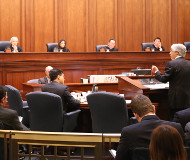9/6/2017
California Supremes Weigh In On License Plate ReadersLos Angeles, California will have to turn over license plate camera records after state Supreme Court ruling.

California police agencies may no longer hide the extent of information they have been collecting from motorists with automated license plate readers (ALPR, also known as ANPR in Europe). The devices are widely used by law enforcement throughout the state, but there has been little public discussion or oversight regarding the privacy impact. In 2013, the American Civil Liberties Union (ACLU) and Electronic Frontier Foundation (EFF) filed suit to force the Los Angeles Police Department (LAPD) to hand over a representative sample of the records it has been collecting.
At trial, after noting the potential abuse of the plate scanning system, a state judge found such records could not be provided under the public records act because the photographs of the license plates of every passing motorist were investigative in nature (view ruling), and the Court of Appeal agreed (view ruling). The unanimous high court justices, on the other hand, slammed the lower court judges for forgetting their "constitutional obligation" to favor the public's right to access such records.
"It is hard to imagine that the legislature intended for the records of investigations exemption to reach the large volume of data that plate scanners and other similar technologies now enable agencies to collect indiscriminately," Justice Ming W. Chin wrote for the court. "Not only are the concerns underlying the exemption only weakly implicated by the disclosure of the ALPR data, but broadly exempting the data would inflict a far greater blow to the public interest in disclosure than does exempting records concerning more traditional investigations."
The justices noted that cameras could be used to scan every vehicle in the state, but if police created a "hot list" looking for a single stolen car, they could claim that one "investigation" would protect the entire operation from public scrutiny.
"Perhaps the most critical point, however, is one that the Court of Appeal did not mention: Our constitution requires that California Public Records Act exemptions be narrowly construed," Justice Chin wrote. "Accordingly, we hold that real parties' process of ALPR scanning does not produce records of investigations, because the scans are not conducted as part of a targeted inquiry into any particular crime or crimes."
The high court, however, was not comfortable with releasing unredacted records that would pinpoint the locations of vehicles with their license plate numbers. The high court sent the case back to determine whether annonymized data could fulfill the ACLU and EFF information request without unduly affecting motorist privacy.
A copy of the ruling is available in a 200k PDF file at the source link below.


